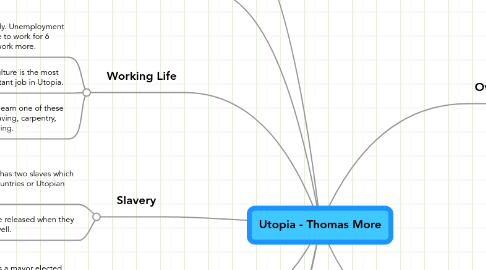Utopia - Thomas More
by Khuyen Nguyen

1. Humor and Parody
1.1. The title Utopia means no where.
1.2. Each community and government is referred to as a Sty, where pigs live.
2. Division of Property
2.1. No one owns property. Every ten years, people are switched around. People go to different houses and households.
3. Working Life
3.1. Men and women work equally. Unemployment is eradicated. They only have to work for 6 hours while others willingly work more.
3.2. Agriculture is the most important job in Utopia.
3.3. Everyone must also learn one of these essential trades, weaving, carpentry, masonry, metalsmithing.
4. Slavery
4.1. Every household has two slaves which are from other countries or Utopian slaves.
4.2. Slaves are released when they behave well.
5. Government
5.1. Each town has a mayor elected from among the ranks of the Bencheaters.
5.2. The educated are reasonable enough to be in charge.
5.3. Communal society.
6. Social Critique of Great Britain
6.1. No private ownership and possessions. Everything is stored in warehouses and people request what they need.
6.2. Talking about opposite of Great Britain, and their obsession of private property.
7. Happiness
7.1. The people learn during their leisure time.
8. Overview
8.1. Thomas More's Utoia is a Christian-humanist view of an ideal society.
8.2. More does not simply offer a theoretical view, but provides specifics for how to create this world.
8.3. Utopia offers a Christianized from of Plato's Republic.
9. Christian Synthesis
9.1. The Christian aspect of the synthesis is Christ's gospel of caring for the poor, the oppressed, and the downtrodden.
9.2. The Platonic, Republican tradition is the Greek aspect of the synthesis.
9.3. More wrote Utopia with comedic tone, allowing him to speak his truth while telling a deeper story.


